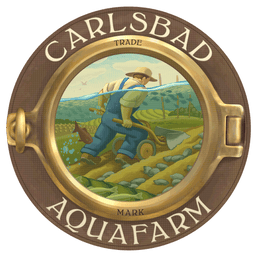· By Carlsbad Aquafarm
Sustainable Aquaculture
Introduction: As the global population continues to grow, ensuring food security becomes a paramount concern. Traditional terrestrial farming has long been the primary source of food production, but the rise of sustainable aquaculture presents a promising alternative. With the ability to meet growing demand while addressing environmental challenges, sustainable aquaculture brings a host of benefits when compared to its terrestrial counterparts.
-
Resource Efficiency: Sustainable aquaculture requires significantly less land, water, and feed compared to terrestrial farming. Fish can be reared in dense, controlled environments, maximizing space utilization and reducing the strain on limited resources. Unlike livestock farming, aquaculture minimizes land usage and helps preserve natural habitats.
-
Lower Environmental Impact: Aquaculture systems can be designed with eco-friendly practices that reduce pollution and habitat destruction. Modern technologies enable efficient waste management and water treatment, preventing the contamination of nearby ecosystems. Furthermore, sustainable aquaculture produces lower greenhouse gas emissions than conventional livestock farming, contributing to the fight against climate change.
-
Diverse Nutrition: Fish and other aquatic organisms offer a rich source of high-quality protein, omega-3 fatty acids, and essential nutrients. Sustainable aquaculture allows for the production of various fish species, enhancing dietary diversity and reducing overreliance on land-based meat sources. By providing an alternative protein source, aquaculture plays a crucial role in combating malnutrition and improving global health.
-
Sustainable Seafood Production: Overfishing and depletion of wild fish stocks are significant concerns in traditional fishing practices. Sustainable aquaculture offers a solution by cultivating fish in a controlled environment, thereby relieving pressure on natural ecosystems. It promotes responsible fishing practices, conserves marine biodiversity, and helps replenish wild populations.
-
Economic Opportunities: Sustainable aquaculture presents significant economic potential, particularly for coastal communities. It supports local job creation, stimulates economic growth, and fosters entrepreneurship. Additionally, by reducing reliance on imported seafood, countries can enhance food security and promote domestic industry development.
Conclusion: Sustainable aquaculture emerges as an environmentally sound and economically viable solution to address the challenges of food production in the face of a growing global population. With its resource efficiency, reduced environmental impact, nutritional benefits, and economic opportunities, aquaculture offers a sustainable pathway to meet future food demands. By embracing responsible aquaculture practices, we can ensure the well-being of both our planet and its inhabitants, paving the way for a more resilient and food-secure future.

